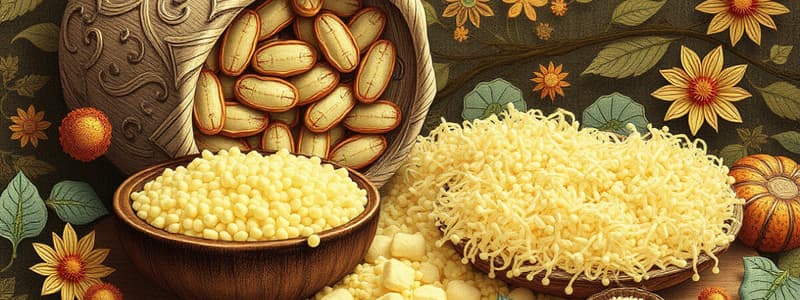Podcast
Questions and Answers
Describe both refined and unrefined carbohydrates.
Describe both refined and unrefined carbohydrates.
Unrefined (whole) carbohydrates are carb sources eaten in their natural form or with minimal processing. Refined carbohydrates are processed carbs, typically have a portion of the grain removed, can be a source of empty calories and are lower in nutrient density.
Define enrichment.
Define enrichment.
Enrichment is a type of fortification which adds back some, but not all, of the nutrients (often vitamins) lost in processing.
Describe whole grains. What are some different types of whole grains?
Describe whole grains. What are some different types of whole grains?
Whole grains are unrefined carbohydrates that include the entire grain kernel, consisting of the germ, bran, and endosperm. Different types of whole grains include oats, wheat, barley, and rye.
Describe the structure of whole grains and how its structure is affected during refinement.
Describe the structure of whole grains and how its structure is affected during refinement.
What is the composition of carbohydrates? Give examples of such.
What is the composition of carbohydrates? Give examples of such.
What are the 3 types of monosaccharides and their sources?
What are the 3 types of monosaccharides and their sources?
What are the 3 types of disaccharides and their source?
What are the 3 types of disaccharides and their source?
Describe how added sugars differ from natural sugars.
Describe how added sugars differ from natural sugars.
What are added sugars often associated with?
What are added sugars often associated with?
Describe polysaccharides.
Describe polysaccharides.
How is fiber digested?
How is fiber digested?
Briefly describe the energy breakdown of soluble vs insoluble fiber. Are they found by themselves?
Briefly describe the energy breakdown of soluble vs insoluble fiber. Are they found by themselves?
What is the average intake of fiber for men and women?
What is the average intake of fiber for men and women?
Describe soluble fiber and its health benefits.
Describe soluble fiber and its health benefits.
What results from a meal rich in soluble fiber?
What results from a meal rich in soluble fiber?
Flashcards are hidden until you start studying
Study Notes
Carbohydrates Overview
- Carbohydrates are categorized into refined (processed) and unrefined (whole) forms. Unrefined carbs retain most nutrients, while refined carbs result in lower nutrient density and empty calories.
Enrichment
- Enrichment refers to the addition of some nutrients (typically vitamins) back into processed foods, but not all nutrients are restored.
Whole Grains
- Whole grains contain the entire grain kernel: germ, bran, and endosperm. They are less processed and maintain their nutritional value.
- Examples of whole grains include oats, wheat, barley, and rye.
Structure of Whole Grains
- Whole grain structure:
- Endosperm: Contains starch, proteins, vitamins, and minerals.
- Bran: High in fiber, vitamins, and minerals.
- Germ: Rich in oils and vitamin E.
- Refinement removes parts of the grain, typically leaving only the endosperm, which is lower in fiber and nutrients.
Composition of Carbohydrates
- Carbohydrates consist of sugars, starches, and fiber, which are formed from sugar units.
- Types:
- Monosaccharides: Single sugar units (e.g., glucose, galactose, fructose).
- Disaccharides: Two sugar units (e.g., maltose, sucrose, lactose).
- Polysaccharides: Three or more sugar units, including starches and fibers.
Types of Monosaccharides and Sources
- Glucose: Circulates in blood.
- Galactose: Found in milk sugar.
- Fructose: Present in fruits and vegetables; commonly used in high-fructose corn syrup.
Types of Disaccharides and Sources
- Maltose: Comprises two glucose units; found in bread.
- Sucrose: Formed from glucose and fructose; labeled as sugar in Canada.
- Lactose: Composed of glucose and galactose; present in dairy products.
Added Sugars vs. Natural Sugars
- Added sugars are chemically similar to natural sugars but lack nutritional benefits and fiber, contributing to empty calorie consumption.
- Common sources of added sugars include cookies, candy, and soft drinks.
Health Risks Associated with Added Sugars
- Increased consumption of added sugars is linked to various health issues:
- Cardiovascular disease
- Obesity
- Diabetes
- Addictive eating habits
- Dental problems
- Certain acne forms
Polysaccharides
- Typically non-sweet and categorized into starches and fibers.
Fiber Digestion
- Fiber is not digested by the small intestine; some soluble fiber is fermented by bacteria in the large intestine, producing short-chain fatty acids that provide about 2-3 kcal/gram.
Soluble vs. Insoluble Fiber
- Soluble fiber is broken down by gut bacteria, yielding energy, while insoluble fiber contributes negligible energy.
- Most fiber sources contain a mix of both types.
Average Fiber Intake Recommendations
- Women: 25g/day
- Men: 38g/day
Health Benefits of Soluble Fiber
- Soluble fiber dissolves in water and acts as a prebiotic.
- Sources include oats, apples, nuts, beans, and seaweed.
- Benefits include lowering cholesterol and regulating blood sugar levels.
Effects of Meals Rich in Soluble Fiber
- High soluble fiber meals slow nutrient absorption, leading to a slower rise in blood sugar levels by diluting intestinal contents and drawing water into the gastrointestinal tract.
Studying That Suits You
Use AI to generate personalized quizzes and flashcards to suit your learning preferences.




